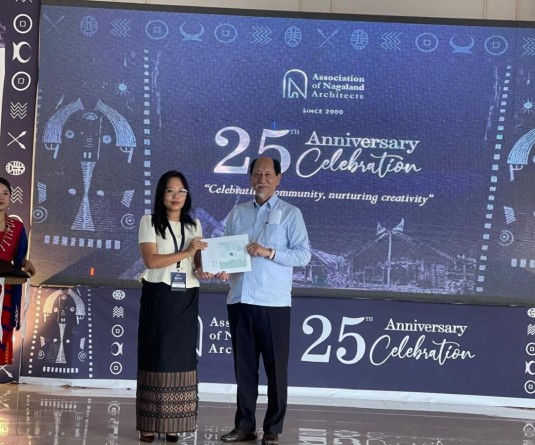
NPMHR Delhi Morung Dialogue: Tapan Bose, Bharat Bhushan
and Col (Dr) DPK Pillay deliberate on the Indo-Naga political issue
DIMAPUR, SEPTEMBER 16 (MExN): In the context of growing apprehensions amongst the public, with contradictory press statements being made by the negotiating parties, the Naga Peoples Movement for Human Rights (NPMHR) organized a dialogue on the Indo-Naga peace process on September 14 in New Delhi.
A press statement issued by NPMHR Delhi Convener, Chingri Vashum said three speakers - Tapan Bose from the South Asian Forum for Human Rights; Bharat Bhushan, Freelance Journalist; and Col (Dr) DPK Pillay, Institute for Defense Studies and Analyses (IDSA) shared their observations on the topic of the dialogue entitled ‘Negotiated or Packaged Solution?.’
Tapan Bose while pointing out that the basis of negotiations has been the recognition of the unique history of the Nagas, said that the source of these problems was the arbitrary carving out of borders by British Imperialists.
Therefore, the issue of integrating contiguous Naga areas had always been a part of the agreement of the talk and there is no historical, cultural or ethnicity-based reason not to integrate.
More immediately, the abrogation of Article 370 by the centre and consequent removal of the flag and constitution of the erstwhile Jammu and Kashmir, raises serious doubts regarding the GoI’s commitment to bring about a solution that is honourable and lasting for the Nagas, Bose stated.
Furthermore, questions regarding whether the GoI intends to treat the Indo-Naga peace process as a political issue, or as a law and order question have been brought up due to the appointment of former interlocutor on behalf of the GoI, RN Ravi, as the Governor of Nagaland.
Besides, the declaration of a limited three-month time frame, he said, is strange for a process that has been going on for the past 22 years and expressed concern on whether it is going to be imposed.
He also stated that market integration of the Nagas into India over the years has resulted in the rise of an incipient class system in Naga society, which is one reason for the weakening of Naga civil society.
He highlighted that given these realities, the NSCN (IM) must regain the support of civil society, much like it had a decade ago; else the solution would be one that is imposed upon the Naga people.
‘Much progress has been made’
Bharat Bhushan asked whether it would be fair to categorize the last 22 years of negotiations as ‘wasted’ years while opining that ‘in fact much progress has been made.’ This, he claimed can be evidenced by the details of the Framework Agreement that have been surfacing, be it regarding sharing of competencies under Union, State and Concurrent lists in the spirit of asymmetric federalism given the unique history of the Nagas; or the integration of contiguous Naga areas via institutions that function as cultural bodies and also have financial powers devolved unto them.
Bushan stated that the agreement should be viewed as a ‘halfway house’ by the Nagas. He, however expressed apprehension that this progress could be derailed going by the recent statements made by the current Governor that the peace process must be concluded within 3 months; that Nagas must remain within the Indian Union; and that the talks must be ‘inclusive’ taking on board any and all bodies.
He argued that the first statement can cause problems if the negotiators are rushed or coerced; the second statement would not be an honourable settlement without the mention of asymmetric federalism and recognition of the unique history of the Nagas. The third may lead to continued fragmentation of Naga representatives and civil society, and co-option if mediated by the GoI instead of the NSCN (IM), given they have been the primary negotiator thus far.
Bushan further urged that the Nagas not let the issue of separate flag and constitution become a stumbling block to negotiations. Regarding the issue of a separate constitution, he stated that there are workarounds and flexibility in the way these may be addressed.
Imposing AFSPA is abdication of responsibility from govts
Col (Dr) DPK Pillay brought to fore the perspective of the GoI and the Army, stating categorically that imposing the AFSPA upon the Naga areas meant the total abdication of responsibility by both the Union and the State governments towards the Naga people, and not the way a country should treat its citizens. But he also added that AFSPA was imposed due to the total breakdown of law and order in the Naga Hills.
While not denying the violence inflicted upon the Naga people, he argued that unlike other armies found in conflict zones across the globe, the ‘Indian army still had personnel with moral fibre.’
A discussion followed where several questions were raised by the audience pertaining to the role of negotiating parties on both sides in achieving meaningful peace, democracy and development; the history of AFSPA in the region and why it had been imposed; the question of who represents the Naga people and with what purpose etc.




